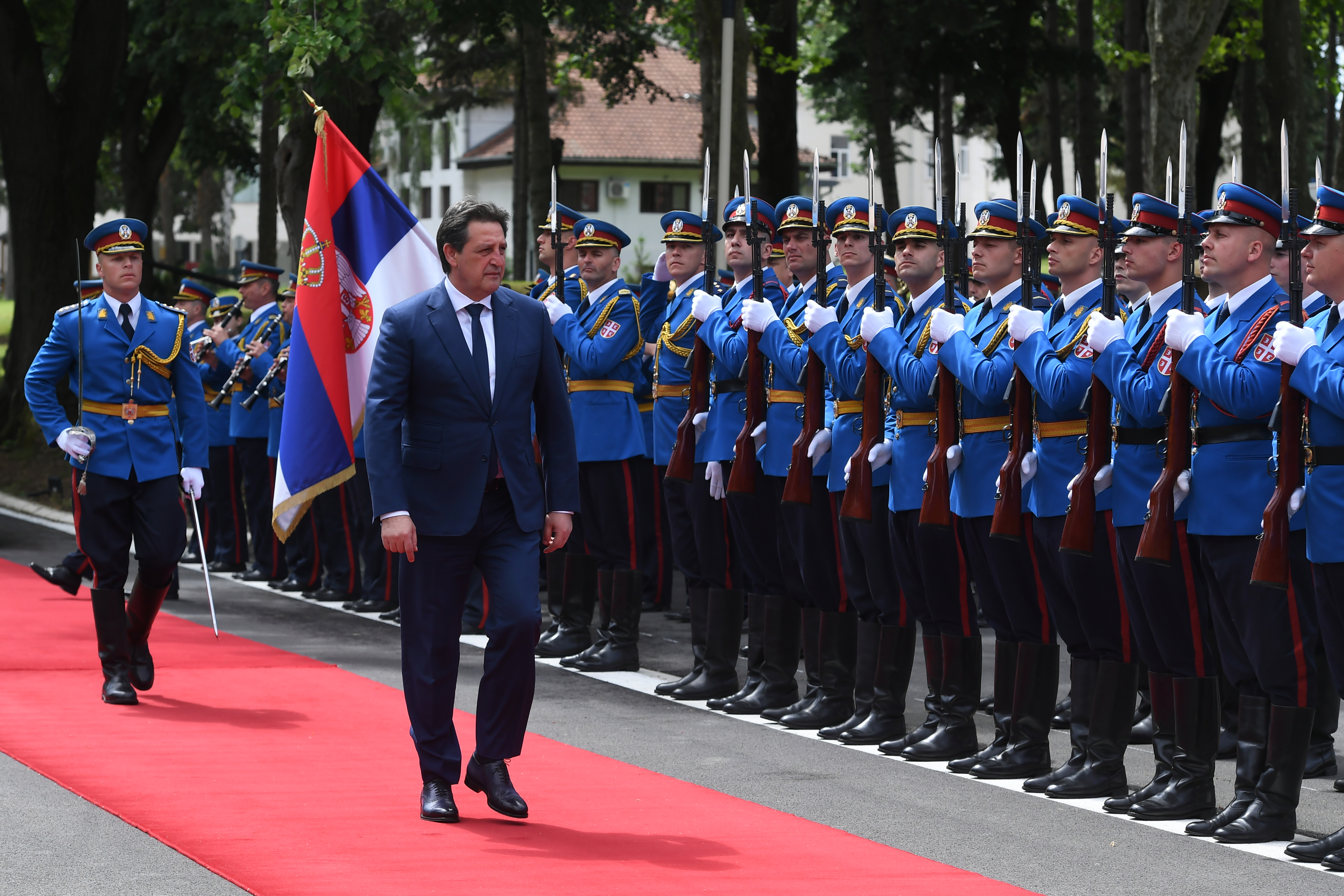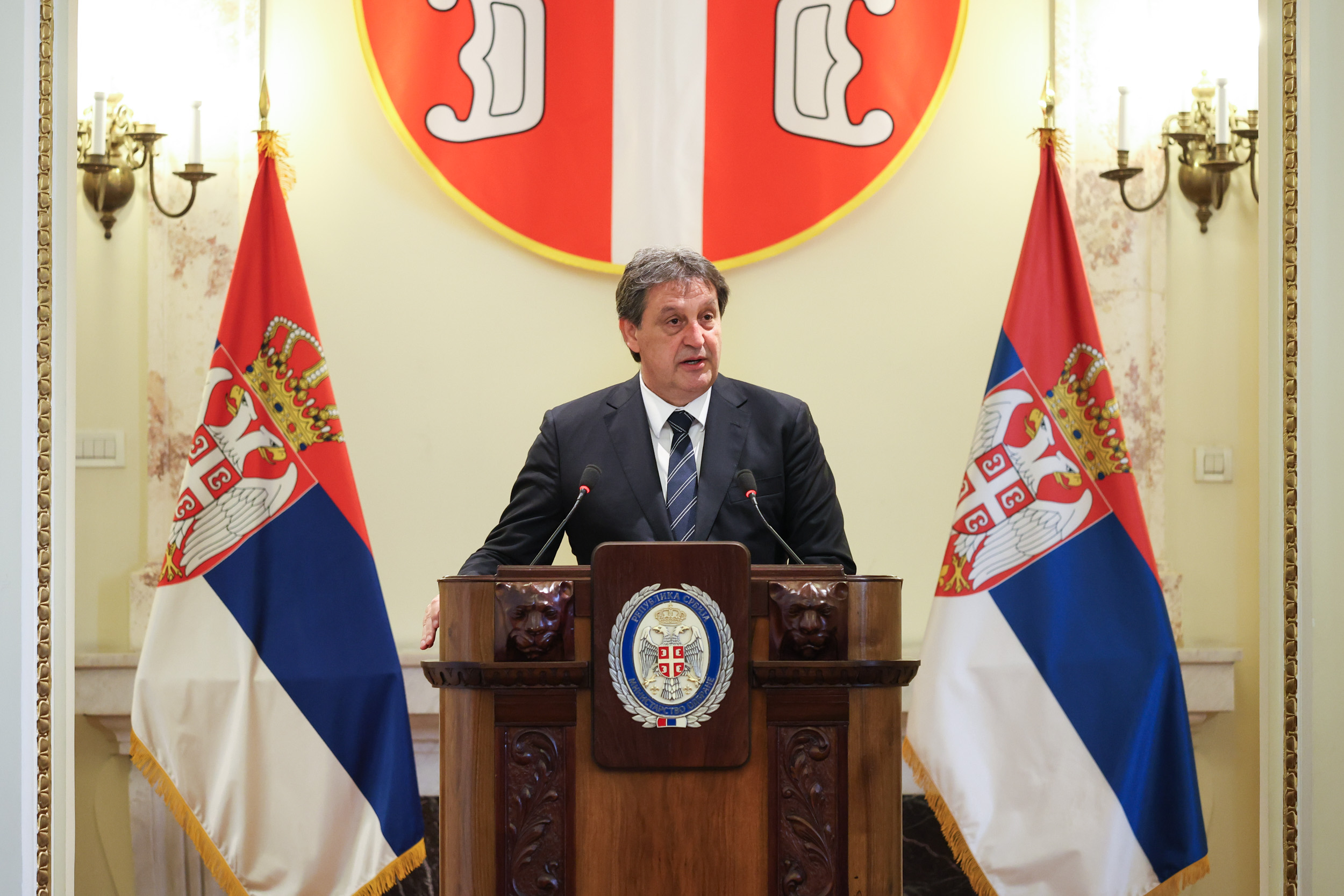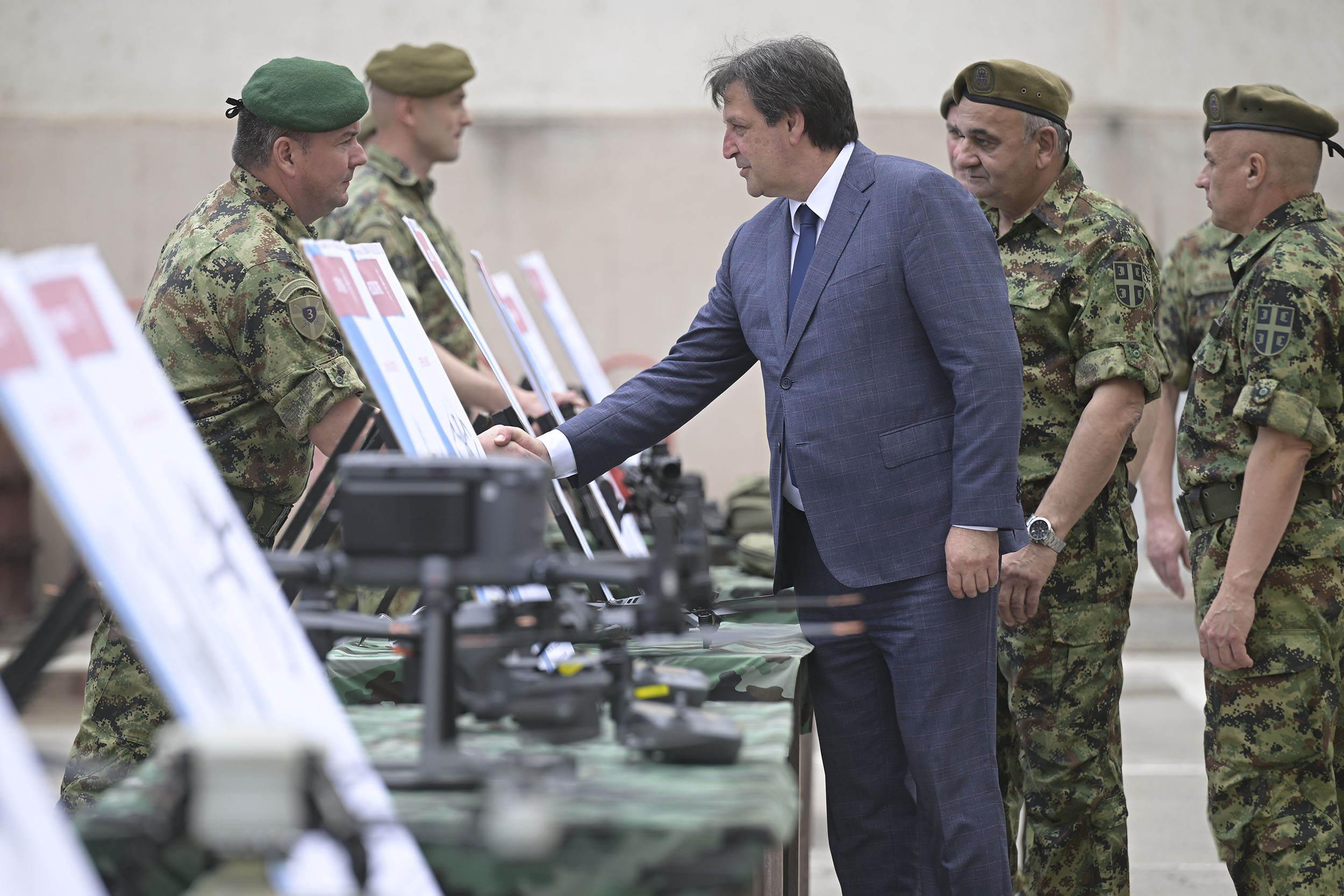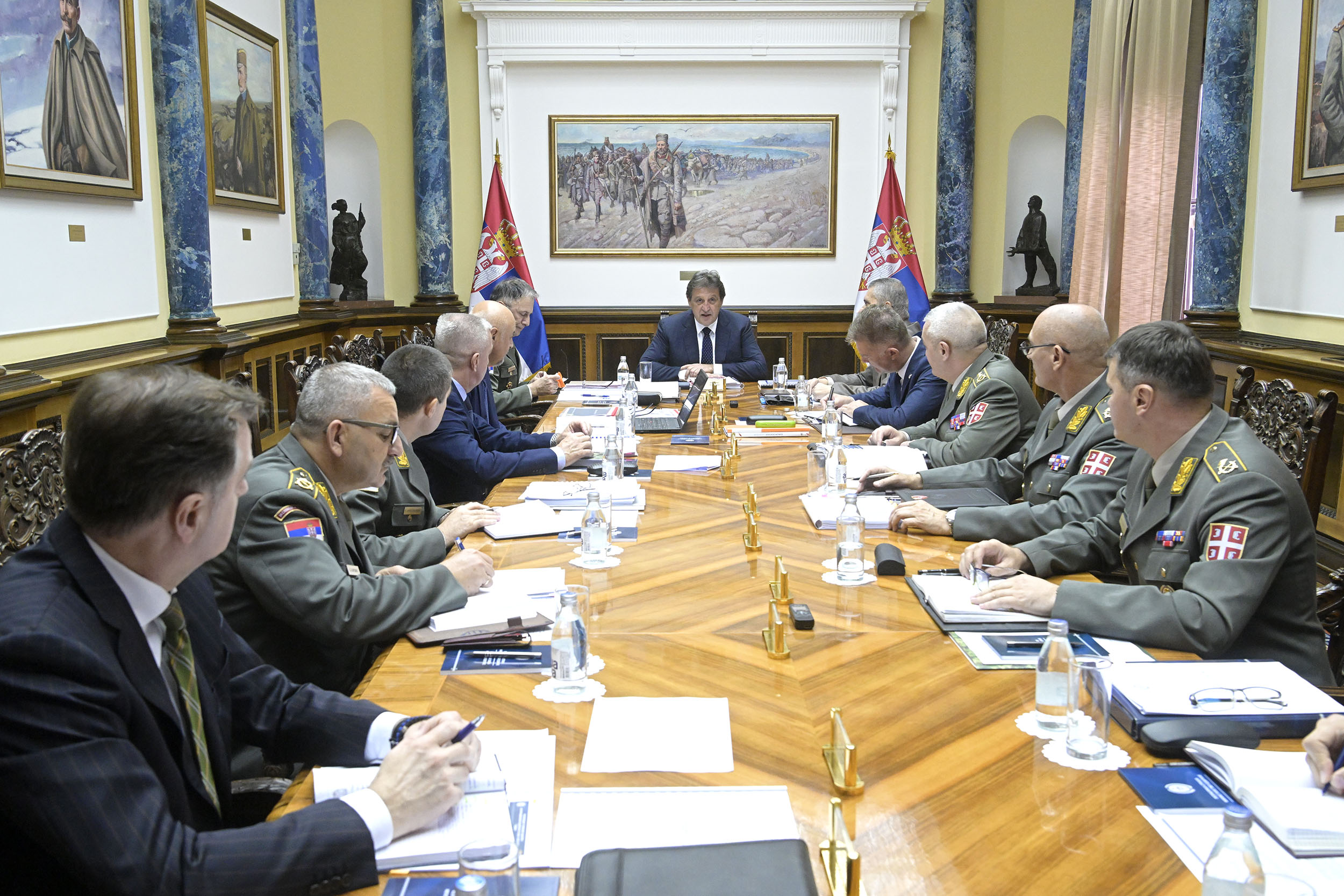04.06.2024.
Interview with Minister of Defence Bratislav Gašić featured in June issue of Odbrana Magazine
Minister Bratislav Gašić is the first official who has been given the chance to head the Ministry of Defence in the Government of the Republic of Serbia twice in his political career. After his first term as the minister of defence at 5 Birčaninova Street, Gašić was the director of the Security and Information Agency and later served as the minister of the interior of the Republic of Serbia, which gave him a well rounded experience of heading major state institutions in the defence and security system. In his first interview since taking office, he says that the strategic commitments made in 2012 pertaining to the development of the defence system will not change.
 – As the old saying goes "the world makes way for the man who knows where he is going". We know what we want and every step we take must help to strengthen the system we are a part of, for the sake of the homeland we serve. That is exactly what I will request from all my associates, from all members of the Ministry of Defence and the Serbian Armed Forces. I will insist on greater work efficiency, bureaucracy reduction and measurability of results.
– As the old saying goes "the world makes way for the man who knows where he is going". We know what we want and every step we take must help to strengthen the system we are a part of, for the sake of the homeland we serve. That is exactly what I will request from all my associates, from all members of the Ministry of Defence and the Serbian Armed Forces. I will insist on greater work efficiency, bureaucracy reduction and measurability of results.Regarding the difference between the starting points for his first and second terms as the minister of defence, Minister Gašić says:
– The answer to that question has several aspects. If we stay within the framework of our institution and compare the situation ten years ago with the one today, relating primarily to the equipment, strength, and general ability of the Serbian Armed Forces to fulfil their constitutional role, we can conclude that there has been huge progress. Revitalization of the defence system is a process initiated by Aleksandar Vučić in 2012. Defence ministers that came after him had the same vision and contributed to the attainment of the same goal, which is for our military to once again be a reliable bulwark against any threats to Serbia’s freedom and independence. The Serbian Armed Forces are exactly that, although we are constantly setting our ultimate goals relating to its development and strength higher. There is a similar difference regarding the economic situation in our country. The state's ability to invest in the development of the defence system is a direct reflection of its economic power, which is incomparably greater today than a decade ago.
According to Gašić, the other differences between the starting points for his two terms as the minister of defence can be seen in the dramatically different global and even regional security contexts, which are primarily characterized by the conflict in Eastern Europe.
– The conflict in Ukraine has brought us face-to-face with the dangers caused by the conflict of interest between global powers. Ten years ago, few people were ready to believe that an armed conflict of such proportions could take place on European soil, the end of which cannot be foreseen at this moment. Tendencies to establish a multipolar world order on the one hand and opposition to such tendencies on the other were evident even then, but the prevailing opinion was that the conflict of interest between East and West would occur primarily on the political and economic levels. Today, however, a large-scale conflict is ongoing on the Old Continent, which shows a terrifying potential of escalating into a full-scale global conflict. What is happening in Ukraine has led many countries to fundamentally reconsider the previously deteremined security threats and strategies for addressing them. Let us not forget that there are still a number of flashpoints throughtout the world that can easily turn into armed conflicts, and one of the obvious examples is the current situation in the Middle East.
 As regards the impact of global security upheavals on the Balkans, the minister says:
As regards the impact of global security upheavals on the Balkans, the minister says:– The Republic of Serbia sticks to the position publically stated by President Vučić following the meeting of the National Security Council held immediately after the outbreak of the conflict in Ukraine. But, sadly, the region we live in has never been immune to the effects of confrontations between great powers. Even before the conflict between Russia and Ukraine broke out, Serbia was in a difficult position, primarily due to the situation in the Autonomous Province of Kosovo and Metohija. President Vučić's policy and the government's efforts to resolve the issue of our southern province’s status through political means and within the framework of public international law were obstructed by certain countries and the extremely aggressive behaviour of the provisional Priština institutions. Kurti's government's attempts to secure the so-called statehood through the final showdown with the remaining Serbs in Kosovo and Metohija and through brutal repression against our people and other non-Albanians living there, have brought us to the verge of conflict several times in the recent period. The hypocritical attitude of the so-called international community about the inviolability of borders and territorial integrity of internationally recognized countries took on even more drastic forms after the conflict in Ukraine began. The pressure exerted on our country in the form of the UN General Assembly’s Srebrenica resolution is the result of our efforts to pursue an independent and balanced foreign policy, to maintain neutrality, to look after our interests only and not to take sides, which, in the context of the aforementioned global confrontations, is exactly what we are expected to do. We are aware of the dangers of such initiatives to the already very complex relations between the peoples and entities in Bosnia and Herzegovina. The position of our country, as the guarantor of the Dayton Agreement, is clear and unambiguous, but at the same time very complex. Any potential attempts to forcefully revise the principles of Dayton Accords to the detriment of Republika Srpska are considered inadmissible by the Republic of Serbia.
Asked to comment on the recently adopted UN General Assembly’s Srebrenica resolution, Minister Gašić says that the result of the vote on it speaks for itself.
– After several weeks of lobbying, tremendous pressure and blackmail by the most powerful Western countries, less than half of UN member states voted in favour of the resolution. Countries that make up more than two-thirds of the world's population did not support it. Let's not forget that many important Islamic countries did not vote in favour of it either. With the support of less than half of member states, such a decision would not be adopted by any parliament, but it is possible in the UN General Assembly... The manner in which that regrettable resolution was adopted and the language used to explain it testify to the depth of political hypocrisy on the part of the international community, but also to the fact that their power and arrogance still have a limited reach. With the power of truth and arguments, a small, independent and freedom-loving country, led by its president, managed to divest the document of its legitimacy.
Commenting on the state of affairs in the system whose helm he has taken over, the minister says that the strategic direction in which the defence system will develop was taken in 2012 and will not be deviated from in the least.
– I will focus my attention primarily on the members of the Ministry of Defence and the Serbian Armed Forces, and the continuation of the process of equipping and modernizing our weapons and military equipment, that is, on the strengthening of our defence capabilities. Our military must be strong and able to thwart any attempt to threaten Serbia’s freedom and independence. I underline that our military power is not a threat to anyone, but a deterrent against any aggressive intentions towards Serbia and the Serbian people.
People will be the centre of his attention, Gašić confirms.
 – The Ministry of Defence and the Serbian Armed Forces are primarily made up of people, and taking care of them will be the first item on my agenda. State-of-the-art combat systems, tanks, aircraft, weapons and equipment mean nothing to us if we do not have a sufficient number of capable, trained and motivated people to use them. Therefore, we will continue implementing measures to improve the overall financial status of members of the Ministry of Defence and the Serbian Armed Forces, and to improve their living, working and training conditions. So far, a lot has been done in this respect and we will do more. I want to strengthen the position of military profession on the pedestal where it has always been, so that our officers, NHCOs, professional soldiers and civilian employees are both provided for and respected in society. Their job is difficult and responsible, full of dangers and sacrifices from the beginning of their schooling to the last day of service. Those people are at the service of their country at all times, ready to give their all for its freedom. I am proud that we - the political leadership, have supported the opionion that the state must finally find a way to improve the quality of life of these people and their families. I hope that in the coming period, after in-depth analyses have been carried out, we will come up with new concrete ways to improve the financial situation of members of the Ministry of Defence and the Serbian Armed Forces. I want young people who have not yet chosen their future professions to hear these words and feel the desire to join our ranks.
– The Ministry of Defence and the Serbian Armed Forces are primarily made up of people, and taking care of them will be the first item on my agenda. State-of-the-art combat systems, tanks, aircraft, weapons and equipment mean nothing to us if we do not have a sufficient number of capable, trained and motivated people to use them. Therefore, we will continue implementing measures to improve the overall financial status of members of the Ministry of Defence and the Serbian Armed Forces, and to improve their living, working and training conditions. So far, a lot has been done in this respect and we will do more. I want to strengthen the position of military profession on the pedestal where it has always been, so that our officers, NHCOs, professional soldiers and civilian employees are both provided for and respected in society. Their job is difficult and responsible, full of dangers and sacrifices from the beginning of their schooling to the last day of service. Those people are at the service of their country at all times, ready to give their all for its freedom. I am proud that we - the political leadership, have supported the opionion that the state must finally find a way to improve the quality of life of these people and their families. I hope that in the coming period, after in-depth analyses have been carried out, we will come up with new concrete ways to improve the financial situation of members of the Ministry of Defence and the Serbian Armed Forces. I want young people who have not yet chosen their future professions to hear these words and feel the desire to join our ranks.The minister of defence says that a new competition for admission to Special Forces has been open since June 1.
– It is the third cycle of competitions for admission of new recruits to the special units of the Serbian Armed Forces. This time, candidates can apply for the 72nd Special Operations Brigade and the Special Purpose MP Detachment “Kobre”. The conditions that candidates need to meet remain unchanged and I invite all young and capable people who love their country and their military, who want to be part of the elite, to apply and come for selective training. It will be difficult, it will be challenging, but those who overcome all challenges will join the best.
As regards the potential reintroduction of compulsory military service, Minister Gašić says the following:
– The Ministry of Defence and the Serbian Armed Forces General Staff have prepared a unified proposal for several conscription models and submitted it to the President of the Republic. It is a very extensive document containing detailed assessments, calculations and implications of each individual model, which differ in terms of the duration of service and number of intakes per year. In the coming period, in consultation with the President of the Republic and Supreme Commander of the Serbian Armed Forces, we will make a decision on whether to submit to the National Assembly a proposal for the repeal of the decision which suspended military service obligation.
His perspective on the matter is reflected in the fact that he belongs to a generation for which he says military service was an indispensable part of the process of maturing, a debt to the freedom in which we were born, an act of patriotism.
– Of course, I personally support the reinstatement of military service obligation, but more importantly - I support this decision as the minister of defence, because the MOD and SAF’s greatest experts on the matter have convinced me that it is a necessary step in building the national defence potential and making society more resilient to numerous security threats. Therefore, when we speak publicly about compulsory military service, it is important that we clearly separate our personal opinions and emotions from the security and defence interests of our people and state. Do not forget that the same matter is being considered in modern Western societies where the ties between the military and the people are nowhere near as strong as in Serbia. And this is not done for the sake of everyday politics or for lack of public debate topics, but solely as a consideration of society's strategic response to potential security threats.
The minister confirms that we can expect the process of equipping the Serbian Armed Forces to stay on course.
 - The process of equipping and modernizing our armed forces has come a long way. Had I not been a part of the security apparatus all these years and had I not, due to circumstances, been informed about the pace of equipping the Serbian Armed Forces, I would not be able to recognize it today. There is no doubt that we will stay the course when it comes to the acquisition of modern weapons and military equipment. We will take every opportunity to develop and produce weapons and military equipment relying on our own intellect and economy, because that is without doubt the best option. In cases where this is not possible due to objective reasons, we will buy in the global market the assets that best suit our needs and interests in terms of characteristics, price, future maintenance, training, and the like.
- The process of equipping and modernizing our armed forces has come a long way. Had I not been a part of the security apparatus all these years and had I not, due to circumstances, been informed about the pace of equipping the Serbian Armed Forces, I would not be able to recognize it today. There is no doubt that we will stay the course when it comes to the acquisition of modern weapons and military equipment. We will take every opportunity to develop and produce weapons and military equipment relying on our own intellect and economy, because that is without doubt the best option. In cases where this is not possible due to objective reasons, we will buy in the global market the assets that best suit our needs and interests in terms of characteristics, price, future maintenance, training, and the like.Minister Gašić dismisses public criticism about the potential acquisition of the Rafale multirole fighter aircraft as it would violate Serbia’s military neutrality.
- Those statements show the lack of competence of the people who made them. So far, we have procured weapons and military equipment from both the east and the west. Our neutrality does not mean that we want to isolate ourselves, but that we refuse to be part of any military alliances. When we bought Pantsirs and Mi-35 helicopters at one point, it did not mean that we would turn to Russia, nor did our purchase of the FK-3 mean that we would enter into a military alliance with China. Likewise, neither the purchase of Airbus H145 helicopters nor the potential acquisition of Rafale jets indicates that we will join NATO. It is true that such a large and expensive procurement has its own economic and political implications, but it certainly does not mean that we are giving up on our neutrality policy.
Our perspective on international military cooperation remains unchanged, as well.
– International military cooperation is the intersection where our foreign policy and defence policy meet. In this sense, our position is clear and well known to all our partners. In the sphere of defence, Serbia remains committed to strengthening cooperation with all countries based on the principles of mutual interest and respect. Our neutrality allows us room to manoeuvre and make decisions on our own and in accordance with our national interests as to who and how we will collaborate with.
According to Minister Gašić, the main impetus towards the progress of the system entrusted to him lies in two important and inseparable dimensions.
– The first is material in nature. My job as minister of defence will be to, in cooperation with President Vučić and the Serbian government, try to provide as much resources as possible, i.e. strong and stable funding of the defence system. And I am sure that, thanks to the state’s strategic commitment to strengthening its defence, it will be possible. On the other hand, there is the other dimension that cannot be expressed in material terms. It is patriotism, honour, sense of belonging, values... Morale has always been and will be a topic to which I will attach utmost importance.
The minister underscores the importance of keeping alive traditions and fostering the culture of remebrance.
– All members of the defence system, from the minister to the soldier, must be aware that we are part of a special social stratum that is distinguished not by its position, but by its mission. That mission hasn’t begun nor will it end with our term of service. We are part of continuous efforts to ensure the survival of this nation that have been going on for centuries. Our determination to be capable and ready to defend our country and people is not, nor can it be based only on present circumstances. Our roots run deep and can be traced back to those who brandished their swords on the Kosovo field and those who fought against the invaders on Mačkov Kamen, who charged with their bayonets on the slopes of Cer and Kaymakchalan... Whoever puts on a uniform and stands under the flag should feel the centuries of our existence and hear the battle cries of those who wore those national symbols before us.
When asked if something has remained the same in the defence system since 2014, when he was appointed the minister of defence for the first time, Gašić says:
– For me, the feeling of great honour for being entrusted with the great responsibility of heading one of the most important institutions in our country has not changed. Especially because the Serbian Armed Forces have a special place in the hearts of our citizens and enjoy the greatest trust. Another thing that has not changed is the professionalism and dedication of members of this system. Thanks to them, since day one I have felt as if I had never left the Ministry of Defence.

